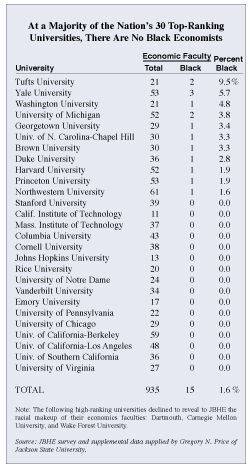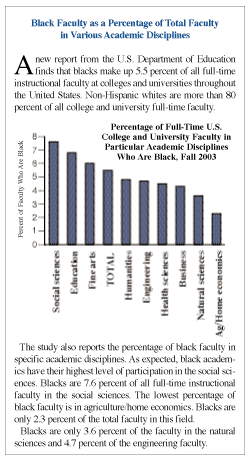| Almost No Black Economists at the Nation's Highest-Ranked Universities A dozen years ago a JBHE survey counted 11 black economists teaching at the nation's 25 highest-ranked universities. Today there are 13 black economists at these 25 leading universities. Even when we expand the universe so as to examine the 100 universities that turn out the most Ph.D.s in economics or the 100 universities that have the largest economics research budgets, the scarcity of black economists is huge and readily apparent.
In a recent interview, Secretary of State Condoleezza Rice was asked why the top echelon of the State Department was almost entirely white. "That's an artifact of foreign policy," Rice said. "It's not been a very diverse profession." The same may be said about academic economics. A dozen years ago in 1994, one of the first faculty surveys conducted by the then-new JBHE found only 11 black economists teaching at the nation's 25 highest-ranked universities. In the ensuing 12 years not much has changed.
In fact, the current JBHE survey found 13 black economists at the same 25 universities we surveyed a dozen years ago. When we expand our survey to include the nation's 30 highest-ranked universities, we found two additional black economists, both of whom teach at Tufts University in Massachusetts. All told there are 935 economics department faculty at these universities. Therefore, the 15 black economists make up 1.6 percent of all the total faculty in the economics departments of the 30 highest-ranked universities. We list here the black scholars whom JBHE has identified as members of the economics departments at the 30 highest-ranked universities: • Marcus Alexis professor emeritus at Northwestern University (Ph.D. at the University of Minnesota, 1959)
It must be noted that there are other black economists at several of these institutions. But these economists may teach graduate-level courses at university business schools or other units such as the John F. Kennedy School of Government at Harvard or the Hoover Institution at Stanford and are not affiliated with the undergraduate economics department at these universities. Examples would include Bernard E. Anderson of the Wharton Business School at the University of Pennsylvania, Darrell J. Gaskin at the School of Public Health at Johns Hopkins University, and Bridget Terry Long of the School of Education at Harvard University. All are African Americans and all hold a Ph.D. in economics. Other Studies Back JBHE's Findings Two other unpublished studies confirm the results of our survey which show there are very few blacks in academic economics. Donna Nelson, associate professor of chemistry and biochemistry at the University of Oklahoma, recently completed a survey of the economics departments at the 96 universities which, according to the National Science Foundation, have the largest research budgets in the field of economics. Professor Nelson's results show that there are only 39 black economists at these 96 universities.
A second study authored by Gregory N. Price, director of the Mississippi Urban Research Center at Jackson State University, examined the 106 universities that produce the most Ph.D.s in the field of economics. Dr. Price found 44 black economists teaching at these universities. There were no blacks in the economics department at 76 of the 106 universities surveyed for the Price paper. All told, Dr. Price's data shows there are 2,785 economists at these 106 universities. Therefore, blacks make up 1.6 percent of all the academic economists at these institutions. Of the 44 black economists at these 106 universities, six teach at Howard University, the historically black institution in Washington. Even at Howard, blacks are only 37.5 percent of the economics department faculty. Professor Price's paper also shows that there is a large group of black economists teaching at the nation's historically black colleges and universities. But there are no black economists teaching at the following universities where there is a large black population: Emory University, University of Georgia, Louisiana State University, Mississippi State University, University of South Carolina, and the University of Virginia. The dearth of black economists teaching at the nation's highest-ranked colleges and universities may not be explained by the fact that there are no qualified African Americans. About 20 blacks each year win a Ph.D. in economics. Black economists are often lured away from academia by lucrative careers in the corporate world. There is a considerable need for professional economists in banks, insurance companies, investment firms, and at major manufacturers. Strong affirmative action programs at these major corporations undoubtedly create a great demand for black economists and the demand, no doubt, results in high salaries and competitive bidding for the skills and services of black economists. The membership roster of the National Economic Association, a trade group of black economists, has hundreds of members. But many of the black economists who are members of the NEA teach at historically black colleges and universities. In addition, there is a significant contingent of black economists who work for the federal government in agencies such as the Congressional Budget Office, the Federal Reserve Board, Fannie Mae, the Department of Labor, the Department of Commerce, and for the Council of Economic Advisers, and the Office of Management and Budget in the White House. Professor Gregory Price of Jackson State University says that in his view the near total absence of blacks on the economics faculty at our nation's leading universities "reflects deliberate racial exclusion." Professor Price told JBHE that the exclusion of blacks from academic economics "is absurd given that most institutions in our society have at least given some lip service to the ideals of affirmative action." Professor William A. Darity Jr., a highly published economist at the University of North Carolina at Chapel Hill, says there are two main reasons for the small numbers of black faculty in economics departments. "First, the presumption remains stronger among economists than other social scientists that blacks are genetically or culturally deficient," Darity says. "This presumption is actually reinforced by the research programs of many economists working on the race question, including some black economists themselves. Second, there is still a pipeline problem in terms of the production of new black Ph.D.s in economics that is largely a consequence of existing faculty failing to encourage sufficient numbers of talented black students to pursue careers as economists." | |





